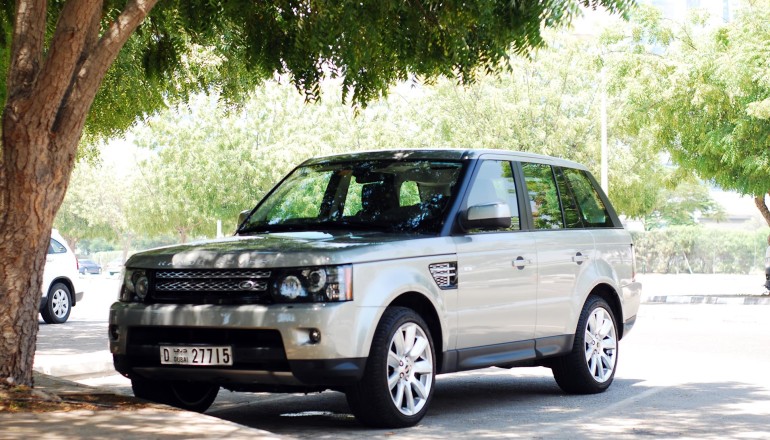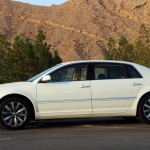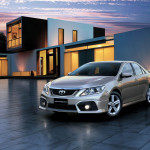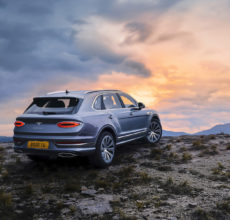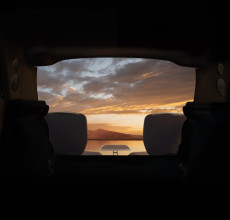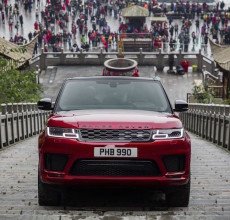Even as the all-new Range Rover 2013 creates a sensation across the luxury SUV world after a decade-long constancy, the younger sibling Range Rover Sport promises to hold its stead for three more years. So, what keeps the mid-size luxury SUV current as we indulge in the Range Rover evolution, DriveME finds out…
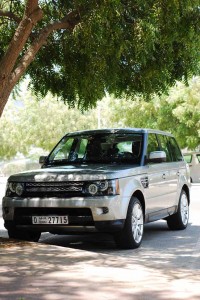
"You enjoy its growl like the wrath of an anti-hero. You enjoy the comfort like the hearth of a gentleman."
Sport has two meanings – at least. The first one suggests a game or activity. The second one refers to “wearing something on your sleeves with the deliberate intension of showing off” or something like that. You could sport a moustache; or an attitude; or a Range Rover Sport. When it comes to the favourite mid-size luxury SUV of the Gulf, nothing could get closer to truth than the latter meaning.
The Drive
It was my meeting with the gargantuan powerhouse the second time in less than three weeks. It drove me just the way I remembered it in the Range rover 2012 Supercharged – quietly in its torque-rich gentlemanly manners at lower rpm levels and with a snarling leap as I let the tachometer needle whirl. Jaguar Land Rover’s remarkable 5.0 LR-V8 petrol engines deliver an astounding 510 PS and 625 Nm torque in my souped-up version and a not-so-meagre 375PS and 510Nm torque in the naturally aspirated version. The high torque given out on gentle urge meant an easy escape from tight spots especially on loose terrain. Both these engines have found their perfect match in the responsive ZF HP28 6-speed automatic transmission.
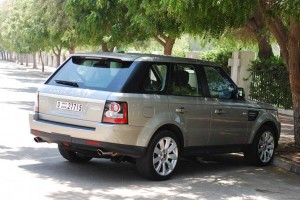
The rear is more refined in the Range Rover Sport, it has the same V8 engine variants as the larger Range Rover.
The Range Rover Sport is one vehicle built for the Gulf, and it’s not just about the region’s penchant for luxury, labels and largeness of things. It’s also about the invitingly flawless roads as well as the varied challenges that lie off road. And it’s ultimately because nowhere else would keeping the Range Rover Sport be this feasible – it drank up more than 20 litres (around 5 gallons) on a trip of 100 kilometres, one way!
Adaptive dampers and Brembo brakes
My drive – the Range Rover Sport 5.0 LR-V8 supercharged had some pretty awesome stuff under its hood and below my feet. Equipped with Adaptive Dynamics, the new dampers are capable of monitoring damper pressure 500 times a second, continuously adapting to surface conditions and driving style. The high performance brakes include four-piston opposed calliper front disc brakes on the naturally aspirated models while my supercharged were kept in place by the lightweight aluminium, six-piston Brembo callipers. It was good to know that the car’s impressive response to my demands had, after all, technologically sound explanations. Like, the variable ratio steering rack that was to improve high-speed stability, as well as the Roll Stability Control system that responds to steering inputs and is supposed to intervene by braking individual wheels if a rollover possibility is detected.
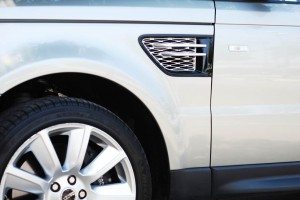
Look at the side gills. In the Range Rover it runs all the way down while in the Range Rover Sport it’s just a short vent.
Take the comfort off road
This Rangie comes with several advanced assistance features to make it pretty simple and safe uphill and downhill, like the Hill Start Assist and Gradient Acceleration control that controls the speed to enable safer decisions. Not surprisingly though, I found the larger Range Rover to lord over off road terrain way better than the Sport – there was a rare feeling of total empowerment about it!
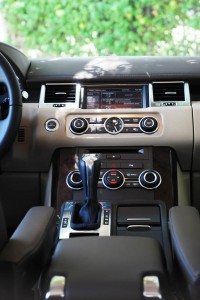
Hard Disc Drive Music server • iPod and video streaming by USB • audio streaming by Bluetooth and two USB ports • Harman Kardon Logic 7 System with 17 speakers • Rear seat entertainment with the option of WhiteFireTM wireless technology incorporating cordless headphones
Cabin and controls
The cabin sure feels more compact when compared with the bigger sibling or even some of the others in the midsize luxury SUV segment. But the windows of the Range Rover Sport are big and wide making it feel roomier than it actually is. Just right for celebrities to wave to the thronging fans but leaving them no place to hide from the Paparazzi!
The upper console, unlike the Range Rover, leans back on the dash, creating a convenient angle to reach out for the controls. But the screen looks a bit odd at this slanting angle and worse still, it makes for hard reading of maps on sunny days, which this region never falls short of.
Even as a premium Harman Kardon Logic 7 system surrounded me with an incredible 825 W of music through 17 speakers, my ‘discovery feature’ for the day was the dual screen mode of the Range Rover, newly added to the cabin of the Rangie Sports. Once through with the astonishment about the dichotomous experience of the driver and front seat passenger watching Sat-Nav and TV respectively, the feature has very little use for those in the UAE or most part of the GCC, where there are not many free-to air channels, unless you are a big fan of camel racing! But of course it’s handy when watching movies on a DVD.
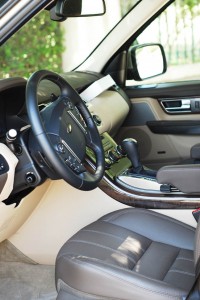
• Dual View touch-screen available for the first time • WhiteFireTM wireless technology enhances rear seat entertainment • 825W audio system powers the Premium Harmon Kardon LOGIC 7 • New powered tailgate • Revised interiors and enhanced design for Autobiography and Limited Edition
The timeless Range Rover design
If you ever were confused how to distinguish the Range Rover from the Sport, despite the difference in size and the lack of rear refinements at the bottom in the larger one, just look at the side gills, next to the A-pillar. In the Range Rover it runs all the way down while in the Range Rover Sport it’s just a short vent. In the all-new Range Rover 2013, this feature has been moved to the front door next to the wedge. Those of you who were fans of the LR3, well, hope survives in the Range Rover Sport – which uses the same platform though modified.
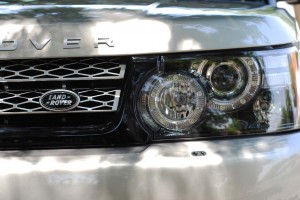
The Range Rover Sport has a more congenial style than the larger sibling - perhaps why it is ubiquitous in the Gulf
The essential Range Rover Sports
As I said, the 5.0L V8 engine is a wonder, to say the least. It works like an unobtrusive butler all along the journey, co-serviced by the exceptional dampers yet when you call for the power to leave the traffic lights and everything behind it a speck in the mirror, it flies to your aid like a ninja; only, the roar is still a suggestion of menace. You enjoy its growl like the wrath of an anti-hero. You enjoy the comfort like the hearth of a gentleman.
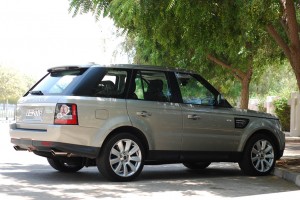
0-100 kmph 6.8 sec, Fuel efficiency: 4.88 km/L (21 L/100 km), Price: AED 299,000 to AED 434,000 (test version)
UPSIDE: Striking design, luxury and power balance, Dual screen viewing, Music system
FLIPSIDE: Just enough legroom, Console angle disagreeable to screen reading, Windows allow a “vulnerable” feeling, At this price you may consider a full-scale Range Rover
Drive Courtesy: Al Tayer Motors
Picture courtesy: Sudeep Koshy

